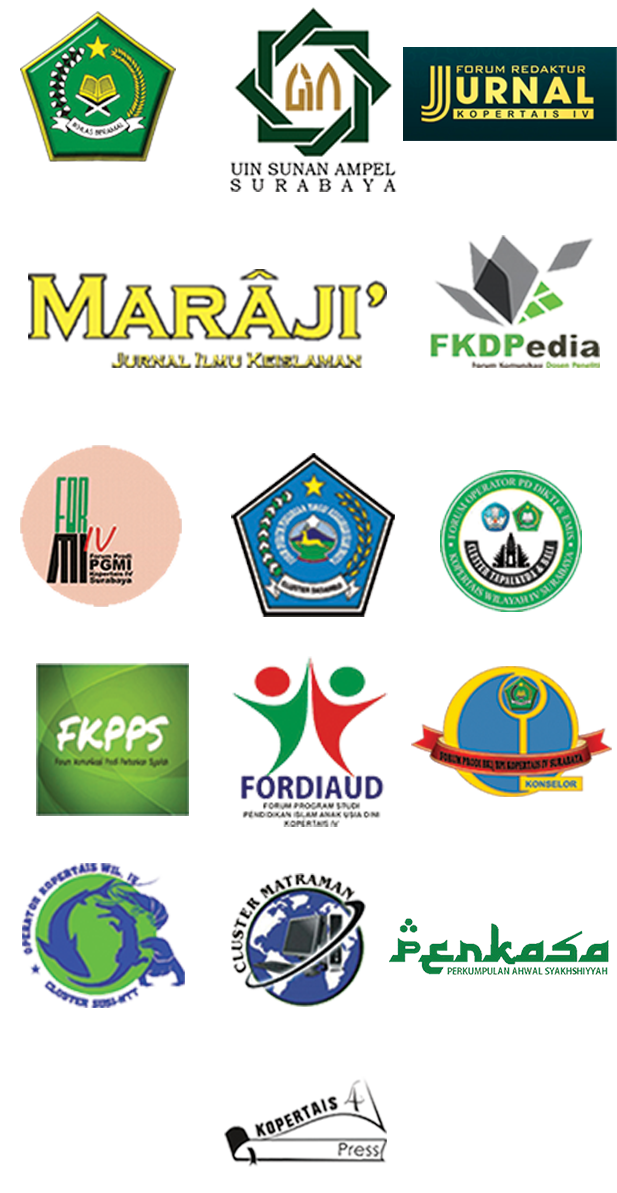Manajemen Kurikulum Berbasis Etnosains untuk Pewarisan Budaya Berkelanjutan
Abstract
This research aims to find an ethnoscience-based curriculum management model for sustainable cultural inheritance. This research is included in the descriptive research category with a qualitative approach. Data collection methods were carried out by means of Focus Group Discussions, in-depth interviews and also documentation. The research results show that ethnoscience-based curriculum management is structured through four stages, namely planning, organizing, actuating, and controlling. In implementing an ethnoscience-based curriculum, you must pay attention to the principles of integration, relevance, efficiency, effectiveness and flexibility. The learning process in an ethnoscience-based curriculum uses a contextual approach by presenting learning content in a context that is relevant to students based on their cultural and social realities. The form of learning is active learning. The forms of strategy that can be used by educators are group discussions, project based learning (PjBL), problem based learning (PBL), discovery learning, inquiry learning, and presentations to build in-depth understanding. Apart from that, cultural reflection can also be done to build students' critical reasoning.
Downloads
References
Administrator, G20Pedia. “Indonesia Tawarkan Peran Kebudayaan Sebagai Solusi Global.” Jakarta: Info Publik, 8 September 2022.
Atmojo, S. E. “Profil keterampilan proses sains dan apresiasi siswa terhadap profesi pengrajin tempe dalam pembelajaran ipa berpendekatan etnosains.” Jurnal Pendidikan IPA Indonesia 1, no. 2 (2012).
Borgatta, Edgar F., dan Mari L. Borgatta. Encyclopedia of Sociology. New York: Macmilan Publishing Company, 1992.
Boulding, E. Building a Global Civic Culture: Education for a an interdepndence world. Syracuse University Press, 1990.
Fukuyama, Francis. Trust: The Social Virtues The Creation of Prosperity. New York: Free Press Papaerback, 1996.
Hamalik, Oemar. Manajemen Pengembangan Kurikulum. Cet. IV. Bandung: PT Remaja Rosdakarya, 2010.
Harrison, Lawrence. Culture Matters, How Values, Shape Human Progress. USA: Basic Books, 2000.
Haudi, Haudi. Manajemen Kurikulum. Solok: Insan Cendekia Mandiri, 2021.
Hindaryatiningsih, Nanik Hindar. “Model proses pewarisan nilai-nilai budaya lokal dalam tradisi masyarakat buton.” Sosiohumaniora 18, no. 2 (2016): 100–107.
Lawton, Dennis, dan Robert Cowen. Values Culture and Education: An Overview. London: Kagan, 2001.
Masduqi, Harits. “Pengaruh Globalisasi Terhadap Kebudayaan Nasional.” Universitas Negeri Malang: Semarang, 2011.
Nafi’ah, Jauharotun, dan Muhammad Mahfud. “Pengaruh Bermain Hopschotch Modification Terhadap Perkembangan Kognitif Anak Kelompok A Di Ra Al-Azhar Menganti.” AT-THUFULY: Jurnal Pendidikan Islam Anak Usia Dini 2, no. 2 (2022): 66–73.
Nasbi, Ibrahim. “Manajemen kurikulum: Sebuah kajian teoritis.” Idaarah: Jurnal Manajemen Pendidikan 1, no. 2 (2017).
Nasution, S. Asas-Asas Kurikulm. Jakarta: Bumi Aksara, 2003.
Norman, H.G., dan G.R. Schdmidt. Effectivenes of Problem Based Learning Curricula: Theory, Practice, and Paper Darts. New York: Medical Education, 2000.
Oktavia, Yesi Yuana, Muhammad Mahfud, dan Rahmat Rudianto. “Internalisasi Kesenian Reog Ponorogo Dalam Menumbuhkan Karakter Disiplin Siswa Di SDN 2 Sumoroto Kauman Melalui Kegiatan Ekstrakurikuler.” El-Miaz: Jurnal Pemikiran dan Pendidikan Dasar 2, no. 2 (2023): 62–68.
Parmin, Parmin. “Potensi Kearifan Lokal dalam Pembelajaran IPA di SMP.” Prosiding KPSDA 1, no. 1 (2015).
Perchonock, Norma, dan Oswald Werner. “Navaho Systems of Classifications: Some Implications for Ethnoscience".” Ethnology 8, no. 3 (1969): 229–42. https://doi.org/doi:10.2307/3772753.
Peter F., Olivia. Development The Curriculum. New York: Pearson Education, 2004.
Rusman, Rusman. Manajemen Kurikulum Seri II. Jakarta: PT Raja Grafindo Persada, 2009.
Sowell, Evelyn J. Curriculum An Integrative Introduction. III. New York: Pearson Education, Inc., 2012.
Videbeck, R., dan Pia J. “Plans for Coping: An Approach to Ethnoscience. Syracuse University.” Anthropological Linguistics 8, no. 8 (1996): 71–77.
Winangun, I. Made Ari. “Media Berbasis Budaya Lokal dalam Pembelajaran IPA SD.” Edukasi: Jurnal Pendidikan Dasar 1, no. 1 (2020): 65–72.
Yuhasnil, Yuhasnil. “Manajemen kurikulum dalam upaya peningkatan mutu pendidikan.” Journal Of Administration and Educational Management (ALIGNMENT) 3, no. 2 (2020): 214–21.
Yuki, Gary. Leadership in Organization. New Jersey: Pearson, 2010.
Copyright (c) 2024 Muhammad Mahfud, Rahmat Rudianto

This work is licensed under a Creative Commons Attribution-ShareAlike 4.0 International License.









